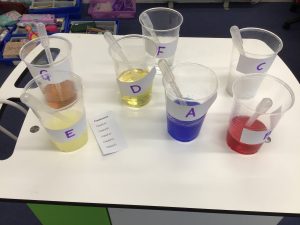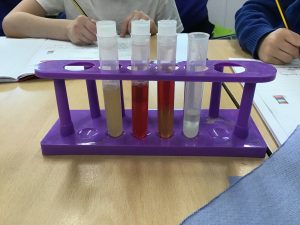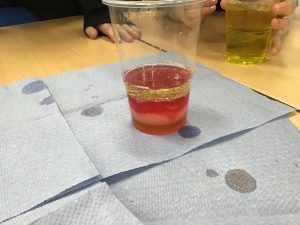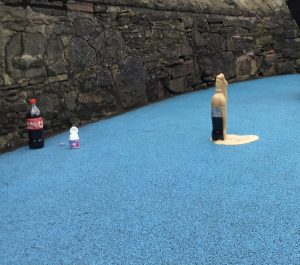Science
Science Intent:
At Mottram CE Primary School, we aim to build upon children’s natural excitement and curiosity about the world around them, through the teaching and learning of Science. We recognise the importance of Science in our modern lives and aim to provide our pupils with as many opportunities as possible to learn about these Science concepts and build up a key foundation of knowledge, whilst maintaining a hands-on, practical approach to learning. We aim to promote a love of learning through experimentation, whilst creating memorable experiences which will prepare them for the world of Science in their later lives.
Science Implementation:
Early Years Foundation Stage:
In Early Years Foundation Stage (EYFS), the teachers use the Development Matters document to plan, leading to the achievement of The Early Learning Goals (ELG) set out in EYFS Statutory Framework. Science is taught through the specific area of ‘Understanding the World’, where pupils look at ‘The Natural World’. They will talk about the world around them, including seasons, plants and animals and the environment. They will be introduced to new scientific vocabulary and make observations about what they see.
Key Stage 1 and 2:
Science is taught weekly throughout the school and follows our two Science progression documents: the Science knowledge progression document and the Science skills progression document. These have been developed to ensure we show clear progression from year-to-year and that our pupils are taught in a way that builds on their prior learning and skills.
Our Science lessons are investigation-based and ensure that all pupils are exposed to the five main types of scientific investigation: pattern-seeking, research, comparative and fair-testing, observations over time and identifying and classifying. Pupils are encouraged to consider which of the types of enquiry they have carried out. In Key Stage 1, teachers colour-coordinate each lesson in the books to identify which type of enquiry it demonstrates. From Year 3 onwards, pupils begin to develop the skills needed to do this process independently. Therefore, it is clear in pupil books where children have carried out the different types of investigation.
Wherever possible the investigations are pupil-led. Our pupils are provided with a wide range of opportunities to explore and ask their own questions. The children are then taught the skills needed to lead their own investigations and develop the resilience required to find out the answers to these questions.
Pupils’ work is stored in their books. In each classroom, our school ‘Science Vision’ is displayed. This was generated by pupils at our school to identify what we believe all of our Science lessons should contain.
Pupils are now assessed using TAPS assessment. These assessments are carried out as part of the scheme of lessons. They offer structured, but interesting ways, to assess pupils on their learning within a given topic. Teachers use these at the point at which they fit into their topic and through targeted activities and questions. They are then used to monitor and assess pupils against end of year expectations. Data for Year 3 – 6 is input into SIMS at the end of each term.
We aim to immerse our pupils in Science wherever possible, through visitors to our school and external trips.
Science Impact:
It is clear that pupils at our school enjoy Science. They speak enthusiastically about a broad range of Science learning that is happening throughout our school.
We have recently been awarded the Primary Science Quality Mark (PSQM). This is in recognition of the many improvements which we have made to science teaching, learning, leadership and the wider opportunities in Science in our school. Throughout this process, we showed considerable improvements in many aspects of Science, notably:
- the amount and range of outdoor learning that took place in Science
- increasing Science links between home and school
- exposing pupils to more relevant and current Science outside of their science lessons (increasing the Science Capital of our pupils)
- reviewing, changing and implementing a new assessment process (TAPS)
TAPS assessments now show us that our pupils demonstrate a solid understanding of the Science units that they are being taught.
Pupil Voice
EYFS – I like talking about the flowers and animals.
Year 1 – We grew our own plants and looked after them.
Year 2 – I kept a food diary to see whether our snacks and meals were healthy.
Year 2 – In our class we have our own aquarium! We get new fish every week and we watch a video that tells us how to look after them.
Year 3 – We used the torches to find out whether materials were opaque or transparent.
Year 4 – We like to think of our own questions and plan our own investigations.
Year 5 – The Lego workshop was amazing! We built a space-station with a real light that lit up!
Year 5 – We took apart a flower and identified all the parts.
Year 6 – We can name all the parts of the eye.
Year 6 – I liked learning about electricity. We made our own circuits and tried different components in them.
Policy
Progression
Websites
Reachout Reporter: Fun and up-to-date Science videos https://www.reachoutreporter.com/
BBC Bitesize: resources, videos and games on topics that the children cover in school: https://www.bbc.co.uk/bitesize/subjects/z2pfb9q
BP: Science Investigations for children: https://bpes.bp.com/resources/list/primary
Science Sparks: Exciting experiments to try at home: https://www.science-sparks.com/easy-ideas-for-science-at-home/
Winchester Science Centre and Planetarium: Lots of activities that can be completed at home: https://www.winchestersciencecentre.org/science-home/science-home/#.XsejDG5Fysd



